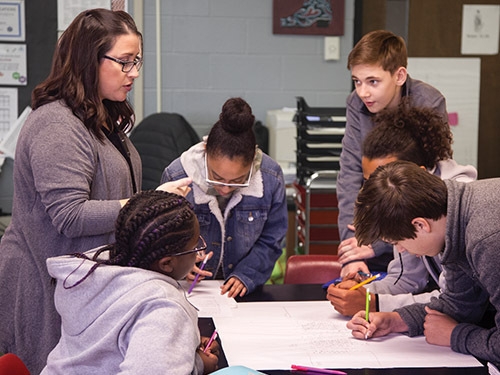Help Create a Higher-Quality Science Education
November 19, 2020
Dear friends,
Three years ago, BSCS Science Learning embarked on one of the most exciting instructional materials development projects in our history. The OpenSciEd Initiative invited us to partner with fellow developers, educators, and leaders across the country to create a middle school science program that would change the way students learn and apply science in their lives.
We are more than halfway through this endeavor—and 16,000 teachers across all 50 states are using the freely available 6th, 7th, and 8th grade units today.
Gretchen Brinza discovered how to create a more equitable science classroom culture for her students in Chicago. Kris Grymonpre believes these units are the key to making his Boston students from underserved communities love science. And in New Jersey, Tommy Clayton has seen students from diverse backgrounds be engaged and challenged.
Tommy recalls when Maya was terrified of science at the beginning of 8th grade. She claimed she was not good at it, did not understand it, and considered it her least favorite class. But then she learned why her phone broke during the Contact Forces unit, and something clicked. The investigation made her realize that she could “do science” and that it was actually “pretty cool.” Maya earned the highest grades in science during her middle school career and even went on to a more advanced science class in high school.
Then there’s Tommy’s student, Jerome, who raved about how much fun he had in science this year. Every day he felt like he was trying to figure out a puzzle. And he loved learning stuff that mattered to him, like how his headphones work in the Forces at a Distance unit. Jerome isn’t a great test taker, but in this class he could draw models and do experiments. It made him feel like he was good at science.
Gretchen, Kris, and Tommy are among the many educators nationwide who are currently seeing dramatic shifts in their teaching practice and student engagement. Their stories of impact keep us invigorated as we lead OpenSciEd’s consortium of developers in completing the three-year middle school science program by 2022.
We are grateful to be a resilient organization that has continued moving forward during this pandemic. Still, our ability to be flexible across all areas of our work is more important than ever. And that ability depends on our support system, made up of individuals like you.
A donation from you is a direct contribution to the more-inclusive, meaningful, and effective science education that we’re pursuing in good times and bad.
Can you make an investment to help create a higher-quality science education for the teachers and students who need it most today?
Sincerely,

Daniel C. Edelson
Executive Director
Photo credit: OpenSciEd and the Dana Center
